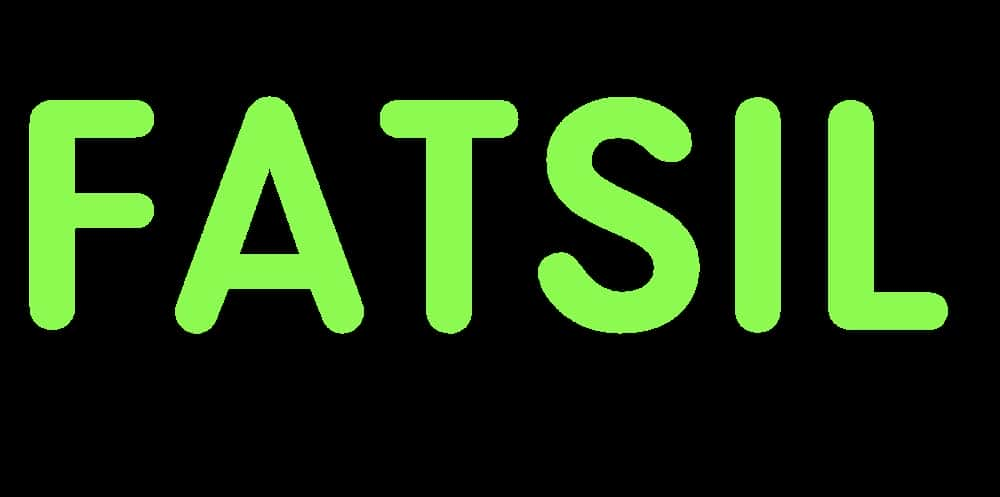Australian Indigenous languages
Empowering Indigenous Language Workers: Training and Developing Specialist Language Speakers for a Sustainable Future

Many times, we overlook the important work done by workers who speak Indigenous languages in preserving and revitalizing endangered languages. Fortunately, there is a program dedicated to providing support, training, and development opportunities to these skilled language speakers.
The impact of this program reaches far beyond just language preservation, and it has the potential to transform the future of Indigenous communities. The strategies and approaches employed are not only innovative but also deeply rooted in the cultural significance of language.
The implications of this work are profound, and understanding the intricacies of empowering Indigenous language workers is essential for anyone invested in the sustainability and resilience of these communities.
Key Takeaways
- Empowering Indigenous language workers is crucial for preserving endangered languages.
- Training and developing specialist language speakers helps to safeguard cultural identity and well-being.
- Investing in language preservation supports community resilience and a sustainable future.
- Recognizing the expertise and contributions of language workers empowers them as custodians and advocates for their language.
Importance of Indigenous Language Preservation
Preserving endangered languages is crucial for maintaining the cultural identity and well-being of indigenous communities. Language isn't just a means of communication; it's deeply intertwined with the history, traditions, and values of a community. When a language is lost, a whole way of life, a unique worldview, and a sense of belonging are at risk of disappearing.
This is a matter of human rights, as language is an essential part of a person's identity and cultural heritage. By preserving indigenous languages, we're safeguarding the fundamental human right to maintain and celebrate one's own culture.
Furthermore, language preservation is directly linked to the overall well-being of communities. Studies have shown that language revival leads to happier, healthier children and stronger, more resilient communities. When people can communicate in their native language, they feel empowered and connected to their roots, which contributes to a sense of belonging and mental well-being.
In essence, supporting language protection means supporting the human rights and holistic well-being of real people. Therefore, investing in language preservation isn't just about preserving words; it's about upholding the rights and dignity of indigenous communities.
Training Specialist Language Speakers
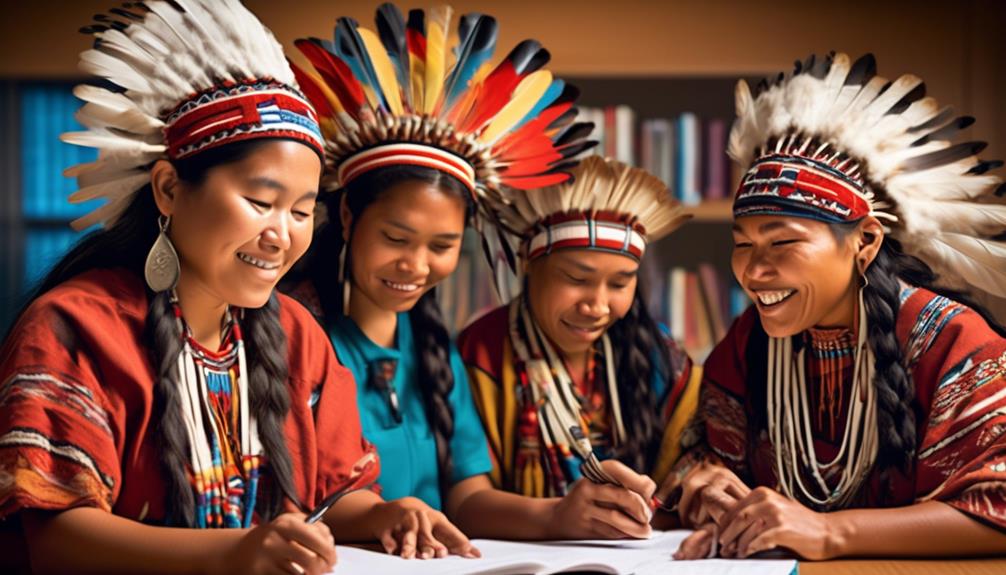
Empowering Indigenous communities through specialist language speaker training is a crucial step in reclaiming, strengthening, and revitalizing endangered languages. This training is vital for preserving and revitalizing endangered languages, and it plays a significant role in the overall well-being of Indigenous communities.
By training specialist language speakers, we can achieve the following:
- Preservation and Revitalization: Specialist language speaker training focuses on preserving and revitalizing endangered languages, ensuring that these languages continue to thrive for future generations.
- Cultural Identity: Supporting language protection means safeguarding cultural identity, which is essential for the well-being of Indigenous communities and individuals.
- Community Resilience: Language protection and preservation are vital for the sustainability and resilience of communities. Training specialist language speakers is a fundamental endeavor in promoting the overall well-being of Indigenous communities.
Training specialist language speakers isn't only about language; it's about empowering communities and individuals to preserve their cultural heritage and ensure a sustainable future. This training is an investment in the well-being of real people and contributes to the resilience and strength of Indigenous communities.
Developing Skills for Language Preservation
Developing skills for language preservation involves actively engaging indigenous communities in the revitalization and protection of endangered languages. By equipping community members with the necessary tools and knowledge, we empower them to take the lead in preserving their language for future generations. This not only supports safeguarding cultural identity but also contributes to the well-being of real people.
Language preservation isn't just about words; it's about supporting the entire community. It's linked to happier, healthier kids, advances in science, and more resilient communities. Empowering Indigenous communities to preserve their languages is a key goal of language preservation efforts. When we invest in language preservation, we're investing in the strength and resilience of these communities. It leads to stronger and more resilient communities.
Empowering Indigenous Language Workers
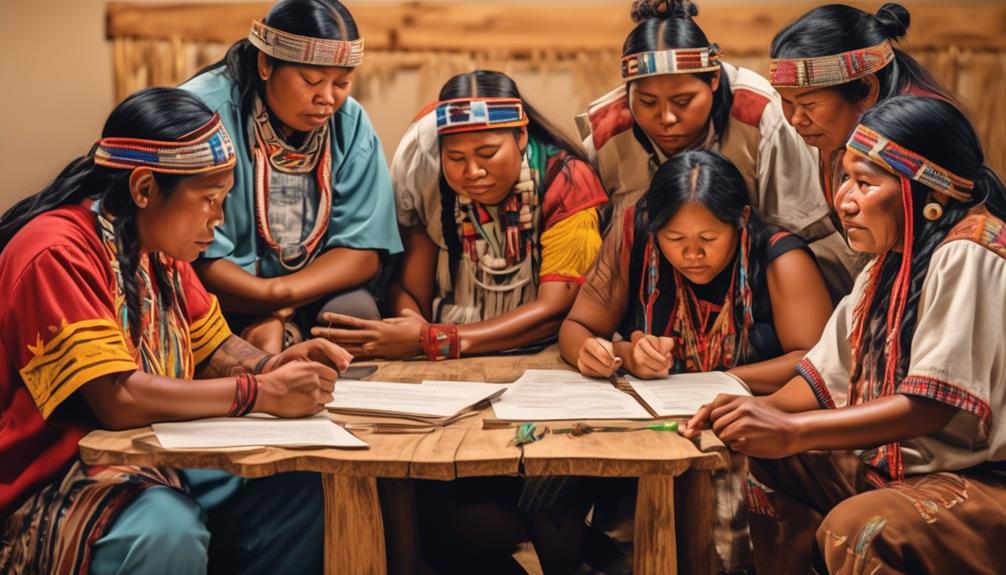
Our efforts to support and uplift indigenous language workers are vital in the preservation and revitalization of endangered languages. By empowering indigenous language workers, we can make a significant impact on the preservation of cultural heritage and the well-being of these communities.
Here's how we're approaching this task:
- Providing Training Opportunities:
- Offering specialized training programs to develop language preservation skills.
- Empowering indigenous language workers with the necessary tools and resources for effective language documentation and revitalization.
- Fostering Community Engagement:
- Creating platforms for indigenous language workers to connect, share knowledge, and collaborate on language preservation initiatives.
- Empowering these workers to take leadership roles within their communities and advocate for the importance of language preservation.
- Recognizing Specialist Contributions:
- Acknowledging the expertise of indigenous language workers as specialists in their languages and cultures.
- Empowering them to take pride in their roles as language custodians and providing recognition for their valuable contributions to language preservation efforts.
Through these initiatives, we aim to empower indigenous language workers to become champions for the preservation and revitalization of their languages, fostering sustainable and impactful change within their communities.
Sustainable Future Through Language Revitalization
As we consider the sustainable future through language revitalization, it becomes clear that our efforts to empower indigenous language workers play a crucial role in preserving and revitalizing endangered languages.
Language revival isn't just about words; it's about creating a sustainable future for communities. By supporting language protection, we safeguard cultural identity and the well-being of real people. Our work is rooted in the belief that every community deserves the opportunity to teach, learn, and sustain their language.
At 7000 Languages, we envision a world where all communities have the resources to reclaim, strengthen, and revitalize their endangered languages. This vision isn't only about preserving linguistic diversity but also about creating a better future for all. Research shows that language revival is linked to happier, healthier kids, advances in science, and more resilient communities.
Through early childhood immersion programs, families and communities can learn Native languages and cultures, contributing to linguistic and cultural competence. By empowering indigenous language workers, we're paving the way for a sustainable future where better user and preservation of endangered languages are at the forefront of community development.
Frequently Asked Questions
How Can We Promote Indigenous Language?
We can promote indigenous language through community engagement.
By actively involving local communities, we can raise awareness, provide resources, and support language revitalization efforts.
Engaging with the community allows us to understand their specific needs and tailor our approach to best serve them.
Together, we can empower indigenous language speakers and create a sustainable future for these precious languages.
What Are the Benefits of Teaching Indigenous Languages?
Teaching indigenous languages is crucial for cultural preservation. It fosters a deep sense of identity and community pride, preserving unique traditions and knowledge.
By preserving these languages, we empower communities to thrive and maintain their heritage. Additionally, it contributes to the well-being of individuals and the overall resilience of societies.
Cultural preservation through language teaching is essential for creating happier, healthier, and more resilient communities.
Why Is It Important to Revitalize Indigenous Languages?
Revitalizing Indigenous languages through language preservation is crucial for preserving cultural heritage and identity. It strengthens communities and safeguards the well-being of Indigenous groups.
Reviving endangered languages is essential for advancing scientific knowledge. By empowering Indigenous language workers, sustainable language revitalization efforts can be achieved.
Language preservation not only serves as a symbol of cultural pride but also fosters resilience and happiness within Indigenous communities.
What Is the Power of Indigenous Language Learning?
Learning indigenous languages holds the power of language revival. It fosters cultural pride, strengthens community bonds, and contributes to the well-being of future generations.
When we engage in indigenous language learning, we honor and preserve the rich heritage and traditions of diverse communities. This revitalization brings joy, resilience, and a deeper understanding of our interconnectedness, ultimately fostering a more inclusive and empathetic society.
Conclusion
As we continue to train and develop specialist language speakers, we're paving the way for a sustainable future where Indigenous communities can reclaim, strengthen, and revitalize their languages.
With the empowerment of Indigenous language workers, we're creating a ripple effect that will lead to stronger and more resilient communities.
The journey towards language preservation and revitalization is just beginning, and the possibilities for the future are endless.
Stay tuned for the incredible impact that's yet to come.
Talise is a talented writer and an expert in her field. Her unique perspective and insights enrich our content with depth and authenticity. With a wealth of knowledge and a strong connection to the subjects she writes about, Talise crafts engaging and informative articles that resonate with our readers. Her dedication to bringing Indigenous culture and wisdom to light is truly commendable.
Australian Indigenous languages
Guide for Language Workers

As language experts, we navigate the intricacies of communication like skilled explorers charting unfamiliar waters. The ‘Guide for Language Workers’ serves as our compass, equipping us with valuable insights and practical strategies for enhancing our language skills, nurturing client partnerships, staying current on industry developments, and honing our abilities.
This comprehensive resource is not just another manual; it's a roadmap to creating a more inclusive and supportive work environment for professionals like us. But what exactly does it entail, and how can it revolutionize the way we approach our language work?
Key Takeaways
- Enhancing language proficiency promotes inclusivity and respect in communication.
- Building strong client relationships is essential for language workers.
- Staying informed about industry trends is crucial for language workers.
- Reflecting on language norms promotes inclusion and diversity in communication.
Language Proficiency Enhancement
Enhancing language proficiency is crucial for fostering inclusivity and respect in our communication. As language workers, it's imperative that we guide adult migrants in developing their language skills to ensure they can fully participate and contribute to society. By equipping them with the necessary language proficiency, we empower them to engage more effectively with others, thereby promoting inclusivity and understanding.
In our role as language workers, we must prioritize the enhancement of language proficiency by creating tailored programs that address the specific needs of adult migrants. This involves not only teaching vocabulary and grammar but also emphasizing the importance of inclusive language. By incorporating pronouns and gender-inclusive language into our teachings, we can create a more welcoming and respectful environment for all individuals.
Furthermore, we must be mindful of challenging heteronormative language and assumptions, as well as addressing ableism in communication. By avoiding derogatory terms and promoting clear and respectful language, we can foster an environment of inclusivity and diversity.
In our commitment to serving others, it's essential that we continue to refine our approach to language proficiency enhancement, ensuring that our guidance is always mindful, open, and inclusive.
Client Relationship Management

In our role as language workers, we actively engage in building and maintaining strong client relationships through effective Client Relationship Management (CRM).
As we serve adult migrants looking to develop work-related language skills, it's crucial to understand the importance of CRM in ensuring their satisfaction and success.
Effective CRM involves not only understanding the specific language needs of our clients but also building personalized interactions based on their individual preferences.
By utilizing CRM systems to organize and manage client information, interactions, and feedback, we can tailor our services to better meet their needs.
Regular communication plays a vital role in CRM, allowing us to anticipate and address client needs, resolve any issues promptly, and continuously improve our services through their valuable feedback.
This approach not only fosters trust but also contributes to long-term client partnerships, essential in our mission to assist adult migrants in developing work-related language skills.
Industry Trends Update
Staying informed about the latest industry trends is essential for us as language workers to remain competitive and make informed decisions for the future. Subscribing to Industry Trends Update provides us with the latest information on developments, emerging technologies, and shifts in consumer behavior. Understanding these trends is crucial as we serve others, including migrants, to adapt to market changes and meet their language needs effectively. Keeping up with the Industry Trends Update can keep us ahead of the curve and informed about shifts in the language industry.
In the context of language workers, it's important to note that the language industry is continuously evolving. As a result, staying informed about the industry trends can help us develop our skills, improve our services, and better serve our clients, including migrants. Additionally, being aware of the latest trends in the language industry can help us align our services with the standards set by organizations such as the Council of Europe, ensuring that we provide high-quality language services that meet the needs of our clients.
Skills Enhancement Strategies

As language workers, we continually seek to improve our skills and enhance our communication abilities through continuous learning and development. One way to secure quality in our work is to reflect on and challenge traditional language norms, promoting inclusion and diversity in communication. Understanding the impact of language on various social groups and consciously using inclusive language can create a more supportive work environment. Embracing pronoun usage and gender-inclusive language is an essential element of our skills enhancement strategies. Actively addressing and challenging heteronormative, ableist, and exclusive language can contribute to a more inclusive workplace.
| Skills Enhancement Strategies | Description |
|---|---|
| Reflecting on Language Norms | Challenge traditional language norms to promote inclusion and diversity in communication. |
| Inclusive Language Usage | Consciously use inclusive language to create a more supportive work environment. |
| Embracing Pronoun Usage | Incorporate pronoun usage and gender-inclusive language as an essential element of skills enhancement. |
| Addressing Exclusive Language | Actively challenge heteronormative, ableist, and exclusive language to contribute to a more inclusive workplace. |
These strategies will help adult migrants develop their language skills and provide support to develop work-related communication abilities. In doing so, we can ensure that we are better equipped to serve others in a more inclusive and supportive manner.
Navigating Industry Complexities

Navigating industry complexities involves understanding how language impacts inclusivity and exclusion within the workplace, recognizing and challenging heteronormative language and assumptions, addressing ableism, and promoting unbiased language to learn from diverse perspectives.
- Inclusivity Impact: Language plays a pivotal role in creating an inclusive workplace. By using inclusive language, we can ensure that all individuals, regardless of their background, feel valued and respected.
- Heteronormative Language: We must actively challenge heteronormative language and assumptions. Adopting gender-inclusive language and recognizing diverse gender identities fosters a more welcoming environment.
- Addressing Ableism: It's crucial to address ableism in language by avoiding ableist terms and promoting clearer communication. By doing so, we create an environment where everyone feels included and understood.
- Promoting Unbiased Language: Embracing unbiased language allows us to learn from diverse perspectives. It encourages open dialogue and understanding among individuals from various backgrounds.
In serving adult migrants who arrive with limited language proficiency, it's essential to support their development of work-related language skills. Whether in Slovenščina, Slovenský, Suomi, Español, Eesti keel, or Français, promoting unbiased and inclusive language is vital for their successful integration and employment in the workplace.
Frequently Asked Questions
What Are the 5 C's of Language Learning?
The 5 C's of language learning are:
- Communication: This involves actively engaging in conversations and interactions in the target language. It helps learners develop their speaking and listening skills, and it allows for cultural immersion and pronunciation practice.
- Culture: Understanding the culture associated with the target language is crucial for language learners. It aids in vocabulary retention and provides insights into the nuances of the language. It also helps learners navigate social situations and better understand the people who speak the language.
- Connections: Language learning is not isolated from other disciplines. Making connections with other subjects or areas of interest can enhance the learning process. For example, learning a language can be combined with studying history, literature, or even science, providing a more comprehensive understanding of the language and its context.
- Comparisons: Recognizing and understanding the similarities and differences between the target language and the learner's native language can be a valuable learning tool. It helps shape perceptions and facilitates the acquisition of new vocabulary and grammar structures.
- Communities: Participating in multilingual communities is vital for language learners. This can include local communities at home or abroad, as well as online communities. Engaging with native speakers and other learners allows for practice, feedback, and cultural exchange, fostering a sense of belonging and providing opportunities for real-life language use.
These 5 C's are essential for effective methods in language learning. They work together to provide a well-rounded and immersive learning experience, helping learners develop their language skills and cultural understanding in a meaningful way.
What Is the Highest Paying Language Jobs?
We, as language professionals, know that the highest paying language jobs are often found in sectors with global demand.
Language specialists in international business, diplomacy, and global marketing can secure high-paying opportunities due to the need for multilingual communication.
Additionally, legal interpreters, medical or technical translators, and language technology experts can command high salaries due to the specialized nature of their work.
These roles offer rewarding opportunities for those with language skills and expertise.
What Are the 4 Skills of Language?
We excel in language interpretation, writing proficiency, oral communication, and cultural understanding. Our ability to bridge linguistic and cultural gaps makes us valuable language workers.
We strive to serve others by effectively conveying thoughts and ideas in both oral and written formats. Our strong cultural understanding allows us to interpret and communicate in a way that resonates with diverse audiences.
Our skills in these areas contribute to our effectiveness as language workers.
What Are Examples of Language Assistance Services?
Translation services and interpretation services are crucial examples of language assistance. Additionally, language tutoring and conversation practice, along with multilingual support and language access, are vital for effective communication.
Language training and bilingual communication are also essential for providing comprehensive language assistance services. These services play a significant role in fostering understanding and bridging the communication gap in various settings, such as healthcare, legal, and customer service.
Conclusion
As language workers, we have the power to create a more inclusive and supportive environment for all. By implementing the strategies and tips in the guide, we can challenge heteronormative language, promote gender inclusion, and support the linguistic integration of migrants.
Let's continue to enhance our language skills, navigate industry complexities, and build strong client relationships. Together, we can create positive change and make a difference in the language profession.
Download the guide and join us on this journey towards inclusion and empowerment.
Talise is a talented writer and an expert in her field. Her unique perspective and insights enrich our content with depth and authenticity. With a wealth of knowledge and a strong connection to the subjects she writes about, Talise crafts engaging and informative articles that resonate with our readers. Her dedication to bringing Indigenous culture and wisdom to light is truly commendable.
Australian Indigenous languages
Indigenous Australian Rights In Education and Language

When delving into the extensive realm of education and language, it is essential to acknowledge the symbolic significance of Indigenous Australian rights within these spheres.
The intricate tapestry of Indigenous cultures and languages holds within it the essence of Australia's rich heritage, and the preservation of these invaluable aspects is paramount.
However, the journey towards equity and inclusivity for Indigenous Australians in education and language is not without its challenges. There are complexities that demand our attention and concerted efforts towards understanding and action.
Join us as we unravel the historical context, grapple with the challenges, and explore the impact of policy changes on Indigenous education, ultimately aiming to uphold Indigenous rights and create a more inclusive and diverse educational landscape.
Key Takeaways
- Systemic challenges and discriminatory practices in Indigenous education
- Neglect of cultural methods of teaching and language preservation
- Shift towards a human rights-based approach in Indigenous education policy
- Preservation and revitalization of Indigenous languages and cultures
Historical Context of Indigenous Education
Examining the historical context of Indigenous education reveals the systemic challenges and discriminatory practices that have shaped the experiences of First Nations, Aboriginal, and Torres Strait Islander students in Australia. The government's historical classification of Aboriginal people based on their ancestry during the protection era has had a lasting impact on Indigenous education. This discriminatory practice has perpetuated a deficit and failure-focused discourse in Aboriginal education policy literature, undermining the potential of Indigenous students.
Furthermore, the One Literacy movement in Australian schooling has contravened the human rights of Aboriginal students by neglecting cultural methods of teaching and language preservation. However, it's crucial to recognize that the Australian Government now acknowledges the significance of Indigenous Peoples' cultural methods of teaching and is working towards integrating them into the education system.
Challenges in Preserving Native Languages
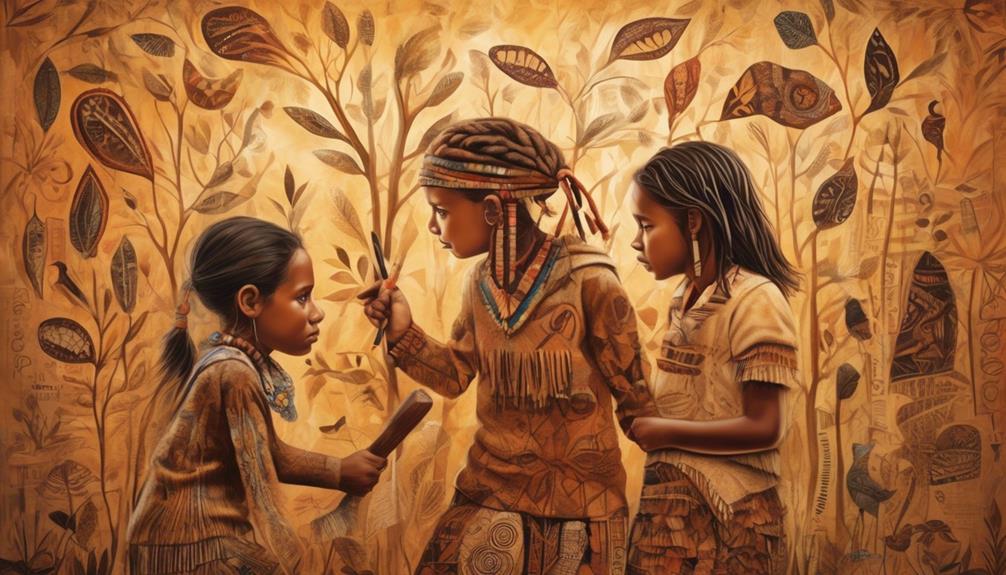
Preserving native languages among Indigenous Australian communities faces significant challenges due to historical classifications and policies that have neglected their linguistic needs and milestones. The teaching of First Nations Languages encounters hurdles due to the prioritization of Standard Australian English literacy, which disregards the linguistic requirements of Aboriginal-language-speaking students.
The Department of Education's focus on economic success through the One Literacy movement poses a significant challenge to supporting the learning of First Nations languages. Furthermore, the implementation of non-Aboriginal benchmarks for educational success contributes to a deficit discourse that overlooks the unique language and literacy milestones of Aboriginal students.
Over time, government policies have oscillated from restricting education during the protection era to recognizing and supporting Aboriginal languages in the era of multiculturalism, affecting the preservation of native languages.
To address these challenges, it's crucial to emphasize the importance of supporting First Nations Educators and the learning of Indigenous people. Collaborative efforts with schools and initiatives such as the Indigenous Languages and Learning Program are vital for the revitalization of Indigenous languages and supporting language learners.
Impact of Policy Changes on Indigenous Education
Policy changes have significantly influenced the classifications and descriptions of Aboriginal students, shaping their treatment and educational opportunities. These changes have been driven by a growing recognition of the importance of First Nations' rights in educational systems and institutions.
As a result, the Government has committed to addressing discriminatory policies and promoting equity for Aboriginal and Torres Strait Islander students. The impact of these policy changes on Indigenous education is evident in several key areas:
- Equity in Education: The Government recognizes the historical disparities faced by Indigenous students and has implemented measures to address these issues. This includes targeted support for Aboriginal and Torres Strait Islander students in primary schools to ensure they have equal access to quality education.
- Human Rights Perspective: Policy changes are aligned with the United Nations Declaration on the Rights of Indigenous Peoples, emphasizing the need to uphold the rights of First Nations peoples within the education system. This has led to a shift towards a human rights-based approach in Indigenous education policy.
- Cultural Inclusivity: The evolving policies aim to create culturally inclusive educational environments that respect and celebrate the diversity of Indigenous cultures. This involves incorporating Indigenous perspectives and languages into educational curricula to provide a more holistic and empowering learning experience for Aboriginal and Torres Strait Islander students.
The Role of Bilingualism in Indigenous Education
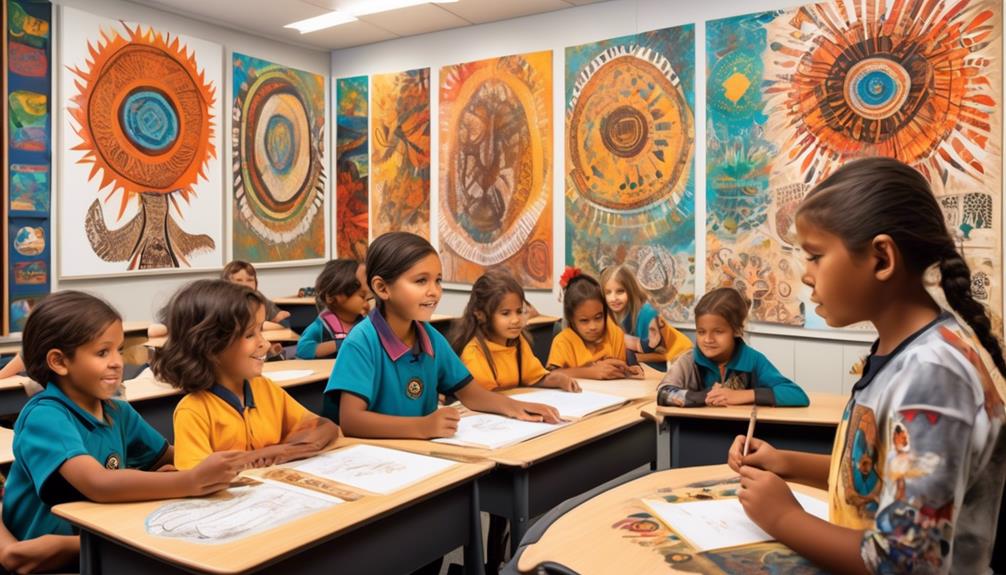
The incorporation of bilingualism in Indigenous education plays a pivotal role in preserving and revitalizing Indigenous languages and cultures. Bilingual education enables Indigenous students to learn in their First Language and Culture, fostering a sense of belonging, self-confidence, and academic achievement.
It also serves as a bridge, facilitating communication and connection between Indigenous and non-Indigenous Australian communities. Government support and funding for bilingual education initiatives are crucial for the sustainability and long-term impact of Indigenous language education.
Additionally, advocating for the establishment of a First Nations-led education system in Australia is imperative to ensure that Indigenous children have access to education in their First Language and Culture. This aligns with the cultural rights of Indigenous Australians, including those from the Torres Strait, and is instrumental in addressing historical injustices in education.
Embracing bilingualism in Indigenous education isn't only a means of promoting linguistic diversity but also a step towards reconciliation and empowerment for Indigenous communities across Australia.
Strategies for Upholding Indigenous Rights
Advocating for Indigenous rights in education requires a comprehensive approach that challenges existing governmental techniques and promotes the recognition of First Nations languages and cultures. To uphold these rights effectively, we must focus on the following strategies:
- Empower Indigenous communities to establish and control their educational systems, ensuring that the curriculum reflects and respects their languages and cultures. This approach will provide a more inclusive and culturally relevant education for Indigenous students, empowering them to succeed while preserving their heritage.
- Support institutions providing education in the Torres Strait and other Indigenous communities, fostering an environment that values and incorporates First Nations language learning and teaching. By doing so, we can promote linguistic diversity and elevate the status of Indigenous languages within the broader educational landscape.
- Advocate for a shift in the mainstream education system in Australia, challenging the current assessment methods that perpetuate a deficit-focused discourse. By pushing for a more holistic and culturally sensitive approach to evaluating educational success, we can better honor the Rights of Indigenous students and communities.
Frequently Asked Questions
Do Australian Schools Teach Aboriginal Language?
Yes, Australian schools teach Aboriginal languages as part of a cultural preservation initiative.
This involves curriculum inclusion, community engagement, and addressing language barriers.
The program aims to revitalize linguistic diversity, promote Indigenous knowledge, and foster cultural identity.
It's vital for reconciliation efforts and supports Indigenous rights in education.
We're committed to providing educational resources and collaborating with First Nations communities to ensure authentic language teaching and ownership.
When Did Indigenous Get the Right to Education in Australia?
We gained Indigenous rights to education in Australia in 1962, marking a pivotal moment in our educational timeline. This shift allowed for more inclusive and standardized efforts in providing education for Indigenous Australians. It was a crucial step towards recognizing disparities and injustices in Indigenous education.
Yet ongoing advocacy and policy development are essential to ensure equitable and culturally appropriate education. This includes focusing on cultural preservation, language revival, government policies, community empowerment, and curriculum development for educational equity. These efforts are necessary to address the unique educational needs and challenges faced by Indigenous communities and to ensure that their cultural heritage is respected and integrated into the education system.
What Role Do Languages Play in the Declaration on the Rights of Indigenous Peoples?
Languages play a pivotal role in the UN Declaration on the Rights of Indigenous Peoples. They advocate for language preservation, cultural identity, and educational empowerment. The significance of languages lies in safeguarding traditional knowledge and mitigating colonial impact. They are integral to Indigenous representation, linguistic diversity, and global recognition of human rights.
It is a testament to the universal value of linguistic diversity and the imperative of respecting Indigenous languages worldwide to uphold the rights and dignity of Indigenous communities.
What Are the Barriers to Aboriginal Education in Australia?
We face numerous barriers to Aboriginal education in Australia. Discrimination, limited educational resources, and socioeconomic factors hinder our progress.
Teacher training, language preservation, and access to traditional knowledge are vital. Additionally, the colonial history impacts us greatly. The remote communities face unique challenges and struggle to maintain their cultural identity.
Overcoming these hurdles requires a comprehensive approach that addresses the multifaceted issues within the education system.
Conclusion
In conclusion, it's high time we put our money where our mouth is and truly support Indigenous rights in education and language.
It's not enough to just talk the talk – we need to walk the walk and ensure that Indigenous cultures and languages are preserved and celebrated in our schools.
Let's make sure that Indigenous Australians have the tools and resources they need to thrive and pass on their rich heritage for generations to come.
Mary is a passionate writer who brings creativity and a fresh perspective to our team. Her words have the power to captivate and inspire, making her an essential contributor to our content. Mary’s commitment to storytelling and dedication to promoting Indigenous culture ensures that her work touches the hearts of our readers. We’re fortunate to have her as part of our team.
Torres Strait Islander Languages
Preserving Torres Strait Islander Languages
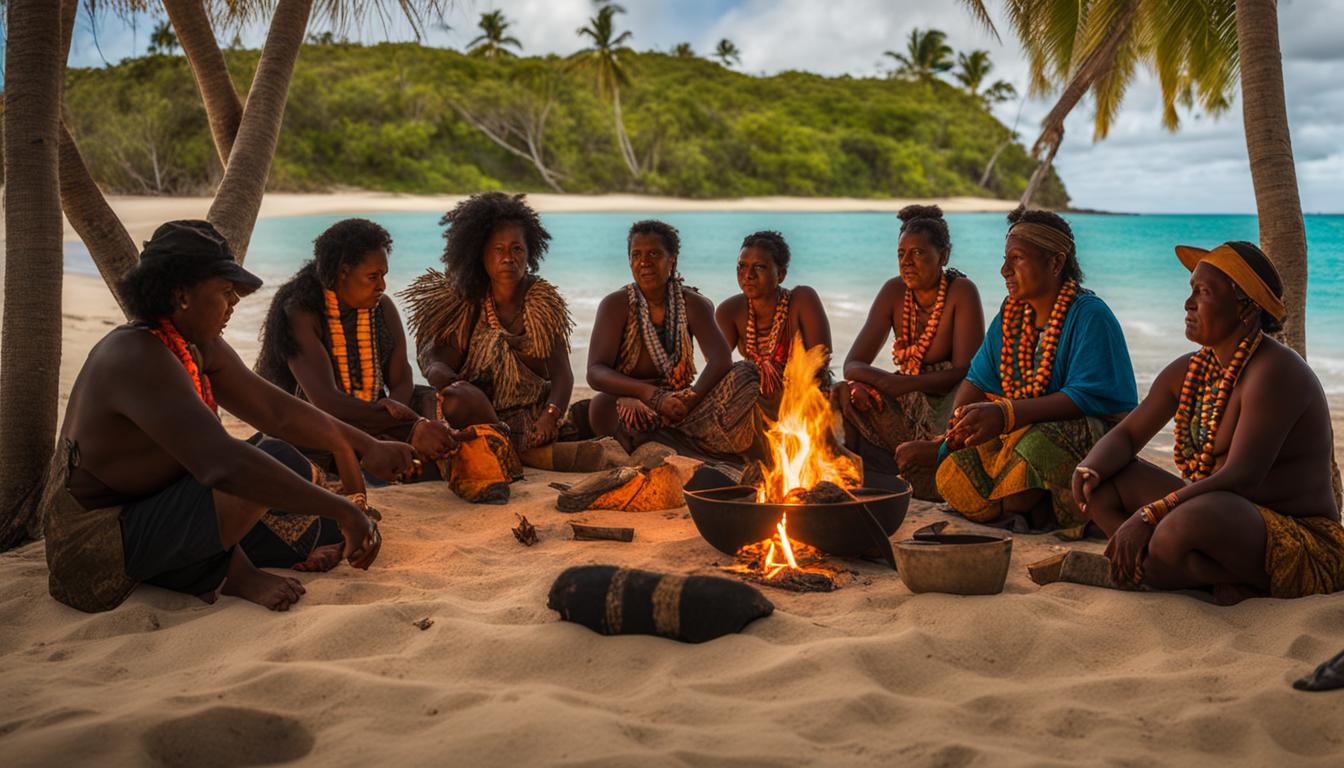
Every July, we come together to celebrate NAIDOC Week, a time set aside to honor and raise awareness about the circumstances and stories of Indigenous Australians. A key focus of this celebration is highlighting the importance and richness of Torres Strait Islander languages. These languages are not just for communication; they hold a wealth of knowledge about law, geography, history, culture, and more.
Over time, the number of Indigenous language groups in the Torres Strait has dwindled. Of the 250 distinct languages once spoken, only around 120 survive today. It is crucial for us to raise awareness and support programs that revitalize and preserve these languages, ensuring their survival for future generations.
Key Takeaways
- Torres Strait Islander languages hold immense cultural and historical significance.
- Out of the 250 Indigenous language groups, only around 120 are still spoken today.
- Preserving and revitalizing these languages is essential for safeguarding Indigenous cultural heritage.
- Efforts are underway to support language revitalization programs and integrate Indigenous languages in education.
- Collaborative partnerships with Indigenous communities are crucial in developing effective language preservation strategies.
Importance of Indigenous Languages
Indigenous languages are the breath of life for Aboriginal and Torres Strait Islander peoples. They hold immense cultural significance and convey knowledge about various aspects of life, deeply rooted in the land and spirituality. Each traditional language is intricately connected to a specific area, carrying the wisdom, customs, and beliefs of generations past. For Indigenous nations, speaking and preserving their ancestral languages is not just a means of communication but a way to maintain a profound connection with their ancestors, land, and law. Therefore, it is crucial to raise awareness about the cultural significance of Torres Strait Islander languages and the urgent need for language preservation in the Torres Strait.
To truly understand the value of Indigenous languages, we must recognize their integral role in expressing and preserving cultural heritage. These languages hold within them the essence of Indigenous identity, encompassing stories, songlines, spiritual teachings, and traditional knowledge passed down through generations. By speaking their heritage languages, Indigenous communities embody and celebrate their unique cultural identity, fostering a sense of belonging and strengthening their ties with the past. Furthermore, Indigenous languages offer profound insights into diverse ecosystems, traditional practices, and sustainable land management, demonstrating the intricate relationship between people and their environment.
“Language is the carrier of our stories. It connects us with our ancestors, our families, and our communities. It holds our cultural values, laws, and customs. Without language, we lose part of who we are.”
By preserving and revitalizing Indigenous languages, we not only safeguard cultural heritage but also create spaces for intergenerational wisdom to thrive. Each language embodies a unique worldview, an invaluable perspective that enriches our collective understanding of the world. Moreover, language preservation strengthens social connections within Indigenous communities, enabling the transmission of cultural knowledge, facilitating stronger social ties, and fostering community cohesion. Through language, Torres Strait Islander peoples honor their ancestors, strengthen their cultural resilience, and ensure the flourishing of diverse Indigenous cultures for generations to come.
The Cultural Significance of Torres Strait Islander Languages
Language Revitalization Efforts
Recognizing the pressing need to preserve Indigenous languages, the Australian government invests over A$20 million annually in activities that assist Aboriginal and Torres Strait Islander people in expressing, preserving, maintaining, and celebrating their cultures through languages and arts. This funding supports community-based Indigenous Language Centres working on 165 languages and diverse traditional and contemporary Indigenous arts projects. Additionally, the government has committed A$10 million over four years to protect, preserve, and celebrate Indigenous languages. Innovative digital solutions, digital skills programs, and career pathways for language workers and linguists are being developed to capture, teach, and revitalize Aboriginal and Torres Strait Islander languages.
Efforts to preserve and revitalize Indigenous languages in the Torres Strait and across Australia are backed by substantial government funding. These initiatives are essential in safeguarding linguistic diversity and ensuring the preservation of the linguistic heritage of Torres Strait Islander communities. The investment of over A$20 million annually supports community-based Indigenous Language Centres that work tirelessly to document, preserve, and maintain Indigenous languages.
The funding also enables the development of diverse traditional and contemporary Indigenous arts projects, promoting cultural expression through various artistic forms. Moreover, the commitment of A$10 million over four years emphasizes the government’s dedication to protect, preserve, and celebrate Indigenous languages. The development of innovative digital solutions, digital skills programs, and career pathways for language workers and linguists further strengthens the efforts to revitalize Aboriginal and Torres Strait Islander languages.
This comprehensive approach highlights the government’s commitment to supporting the linguistic and cultural heritage of Torres Strait Islander communities, ensuring that these invaluable languages are not lost but instead flourish for future generations.
Collaboration and Partnerships
The preservation and revitalization of Indigenous languages in Australia are collaborative efforts between the Australian government and Indigenous communities. Recognizing the significance of Indigenous languages, a National Indigenous Languages Convention was held in 2018. This convention brought together delegates from Indigenous Language Centres, governments, industry, education, and the community.
“Indigenous languages are a vital part of Australia’s cultural heritage and identity. Collaboration is essential to ensure their preservation and future.”
Through collaboration, the convention served as a platform to articulate the current status of Indigenous languages in Australia and explore opportunities for their revitalization. Furthermore, partnerships with esteemed organizations like the Australian Institute of Aboriginal and Torres Strait Islander Studies and the Australian National University are being forged. These partnerships aim to develop comprehensive reports on Indigenous languages, bringing insightful research and expertise to the field.
Collaborative Efforts for Indigenous Languages
Collaboration between the Australian government and Indigenous communities is essential in implementing effective language preservation policies and ensuring the cultural sustainability of Aboriginal and Torres Strait Islander languages. By fostering partnerships, we can collectively work towards preserving the linguistic diversity and cultural heritage of Australia’s Indigenous peoples.
| Partnerships | Organizations |
|---|---|
| Australian Institute of Aboriginal and Torres Strait Islander Studies | Research, documentation, and preservation of Indigenous languages |
| Australian National University | Conducting comprehensive studies and reports on Indigenous languages |
| Indigenous Language Centres | Community-based organizations working on Indigenous language preservation |
Through these collaborations, we can leverage resources, expertise, and community knowledge to develop effective strategies and initiatives for the preservation and revitalization of Indigenous languages.
Integration of Indigenous Languages in Education
Universities and educational institutes play a crucial role in the preservation and revitalization of Indigenous languages. At La Trobe University, we actively incorporate Indigenous languages and culture into our organizational structure, recognizing their significance in preserving Australia’s linguistic heritage. Our Indigenous Education Strategy embraces dreaming, cultural integrity, Indigenous knowledge, and more to create an inclusive and culturally diverse learning environment.
Teaching children in their first language, particularly in the early years, has been proven to enhance educational outcomes. By integrating Indigenous languages into education, we can not only help keep these traditional languages alive but also foster mutual understanding and bridge the gap between Indigenous and non-Indigenous communities.
The Power of Language in Education
Incorporating Indigenous languages in the curriculum offers numerous benefits:
- Preservation: By teaching Indigenous languages, we actively participate in language preservation efforts, ensuring the continuous transmission of cultural knowledge and heritage.
- Cultural Connection: Language is an essential component of cultural identity. Integrating Indigenous languages helps students develop a greater appreciation for diverse cultures and promotes a sense of belonging.
- Inclusive Learning: Inclusion is at the core of incorporating Indigenous languages in education. Acknowledging and valuing the linguistic diversity of Australia fosters a sense of respect and empathy among students.
- Improved Academic Outcomes: Studies have shown that teaching children in their first language enhances their cognitive development, linguistic abilities, and overall educational outcomes.
“Language is more than just words; it carries our culture, our traditions, our understanding of the world.” – Dr. Amanda Rasmussen, Linguistics Professor at La Trobe University
By integrating Indigenous languages in education, we create an environment that not only preserves language but also nurtures cultural pride and understanding. Through our commitment to linguistic diversity, La Trobe University is dedicated to fostering the revitalization and preservation of Indigenous languages for future generations.
| Benefits of Integrating Indigenous Languages in Education | Illustration | References |
|---|---|---|
| Preservation of Indigenous languages | 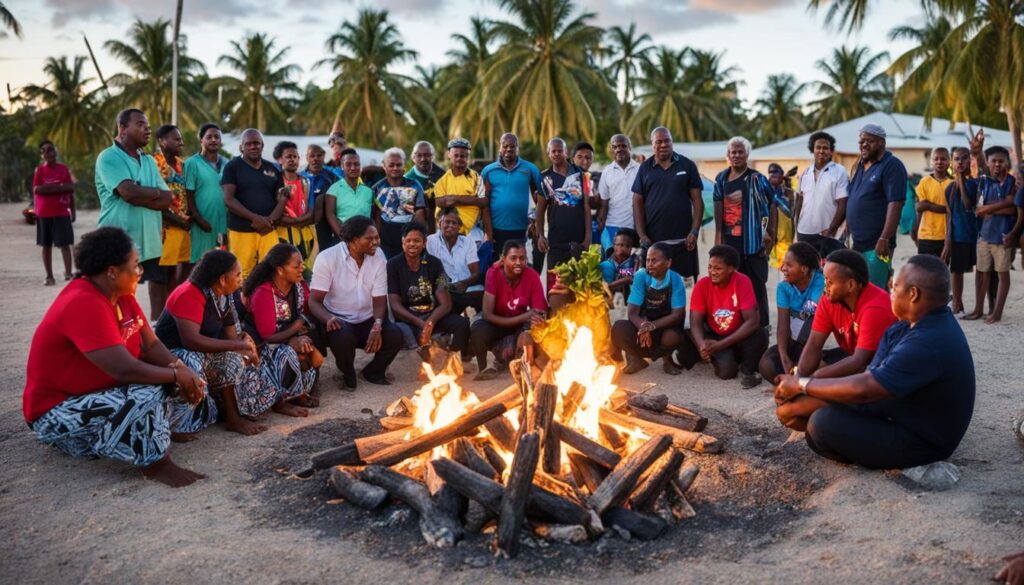 |
1 |
| Development of cultural connection | 2 | |
| Promotion of inclusive learning environments | 3 | |
| Enhanced academic outcomes | 4 |
Language Diversity in Australia
Australia is a linguistically diverse country with a rich tapestry of Indigenous languages. With over 250 distinct Indigenous languages and approximately 800 dialects, the linguistic landscape is incredibly diverse and reflects the unique cultural heritage of the Aboriginal and Torres Strait Islander peoples. Each language is intricately connected to a specific place and community, carrying with it a wealth of cultural knowledge and stories.
In different regions of Australia, the linguistic diversity varies, showcasing the rich tapestry of Indigenous languages. For example, in Arnhem Land, multiple languages are spoken in close proximity, reflecting the close connection between language and local identity. On the other hand, in regions like the Western Desert, dialects of a single language are spoken, highlighting the linguistic intricacies and variations within a language group.
Within the Torres Strait, an archipelago located between Australia and Papua New Guinea, three main languages are spoken: Kala Lagaw Ya, Meriam Mir, and Yumplatok (also known as Torres Strait Creole). These languages are central to the cultural identity of the Torres Strait Islander communities, carrying their unique stories, traditions, and knowledge.
| Region | Linguistic Diversity |
|---|---|
| Arnhem Land | Multiple languages spoken in close proximity |
| Western Desert | Dialects within a single language |
| Torres Strait | Kala Lagaw Ya, Meriam Mir, Yumplatok |
Efforts are being made to preserve and revitalize these Indigenous languages, recognizing their importance in maintaining cultural heritage and fostering a sense of belonging among Indigenous communities. Of particular focus is the Meriam Mir language, which had just over 200 speakers in 2006. By supporting language preservation initiatives and celebrating linguistic diversity, we can ensure the continuation of this invaluable cultural heritage for future generations.
Quote:
“Language is the heart of culture; it embodies our history, traditions, and connections to the land. Preserving our Indigenous languages is crucial for our cultural survival and the well-being of our communities.” – Torres Strait Islander Elder
Language is Identity
Language is more than just a means of communication; it is an integral part of our cultural identity. Indigenous languages in the Torres Strait are deeply intertwined with songlines, stories, spirituality, law, and customs. They carry the important knowledge passed down from our ancestors and elders. Speaking and learning our first languages provide us with a sense of belonging and empowerment.
Preserving and revitalizing Indigenous languages is crucial for maintaining our cultural heritage and ensuring that future generations have a strong connection to their identity.
Our Indigenous cultural heritage is deeply embedded in our languages, which hold significant value and meaning. By preserving and revitalizing our languages, we preserve and revitalize our cultural identity and pass on the knowledge, traditions, and wisdom of our ancestors.

Challenges and Revival Efforts
Past government policies have deeply impacted the preservation and transmission of Indigenous languages in Australia. Forced relocations of Indigenous communities and the separation of children from their families resulted in the suppression of many Indigenous languages and the severing of intergenerational links. Consequently, future generations have been left with limited knowledge of their ancestral languages.
However, languages are resilient and never truly lost. Efforts are now underway to recover and revitalize Indigenous languages, ensuring their preservation for future generations. Collaboration with Elders, historical records, and language centers plays a key role in this revitalization process.
“Languages are not just means of communication; they carry knowledge about law, geography, history, and culture.”
– Torres Strait Islander Elder
By working closely with Indigenous Elders, their invaluable knowledge and understanding of Indigenous languages are being harnessed. Elders are sharing their language skills, cultural insights, and oral traditions with younger generations, helping to bridge the gap and revitalize Indigenous languages.
Historical records, such as audio recordings, written documentation, and language dictionaries, are invaluable resources for language revival efforts. These records provide a foundation for language reclamation and give insights into pronunciation, grammar, and vocabulary.
Furthermore, language centers play a crucial role in the revitalization of Indigenous languages. These centers serve as hubs for language documentation, resource development, and language learning programs.
Ultimately, the revival of Indigenous languages is a collaborative effort that involves Indigenous communities, government support, and wider recognition of the cultural and linguistic heritage that these languages represent.
Challenges and Revival Efforts
| Challenges | Revival Efforts |
|---|---|
| Forced relocations and family separations | Collaboration with Elders to share language skills and cultural knowledge |
| Suppression of Indigenous languages | Utilization of historical records for language reclamation |
| Limited intergenerational transmission | Establishment of language centers for language documentation, resource development, and language learning programs |
Acknowledging Language Diversity
Acknowledging and valuing the diversity of Indigenous languages is essential. On the Torres Strait Islands alone, three main languages are spoken: Kala Lagaw Ya, Meriam Mir, and Yumplatok (Torres Strait Creole). Each language is specific to different islands and communities, reflecting the unique cultural heritage of the region. By celebrating and preserving these diverse languages, we can foster a greater appreciation for linguistic and cultural diversity among all Australians.

| Language | Main Islands/Communities |
|---|---|
| Kala Lagaw Ya | Mainland (Cape York), Mabuiag Island, Badu Island |
| Meriam Mir | Mer Island |
| Yumplatok (Torres Strait Creole) | Across multiple islands in the Torres Strait |
Language Centers for Language Preservation
Language centers play a vital role in the preservation and promotion of Indigenous languages. In Australia, we are fortunate to have twenty-two Indigenous Language Centers dedicated to maintaining, preserving, and promoting the diversity of Indigenous languages. These centers serve as essential hubs for language documentation, revitalization, and the development of valuable resources like dictionaries.
Through their dedicated efforts, these language centers contribute significantly to the preservation of Indigenous languages and cultural heritage. They work closely with Indigenous communities, Elders, linguists, and scholars to ensure the accurate documentation and revival of languages that might otherwise be lost.
Language centers are at the forefront of language revitalization programs, utilizing various methods such as immersive language programs, community workshops, and digital resources to promote language learning and engagement. These programs create opportunities for Indigenous communities to reconnect with their linguistic heritage and pass on invaluable cultural knowledge to future generations.
Indigenous languages are not just a means of communication; they hold the wisdom, stories, and connection to our identity as Aboriginal and Torres Strait Islander peoples. Language centers play a vital role in ensuring that our languages continue to thrive and enrich our communities.
Language Documentation and Preservation
Language centers actively engage in comprehensive language documentation and preservation efforts, capturing linguistic data, vocabularies, grammar rules, and oral traditions. These valuable resources serve as references for language learners, researchers, and community members who seek to understand and communicate in Indigenous languages.
Revitalization Initiatives
Language centers advocate for language revitalization on multiple fronts. They organize language immersion programs, language workshops, and cultural events that celebrate Indigenous languages. These initiatives create spaces where language learners can practice speaking, listening, and writing in their ancestral languages, fostering a sense of pride and connection to their cultural heritage.
Development of Language Resources
Language centers play a vital role in developing language resources, including dictionaries, textbooks, and digital learning materials. These resources serve as essential tools for language learners, teachers, and the broader community interested in exploring and embracing Indigenous languages.
| Key Roles of Language Centers | Examples |
|---|---|
| Language Documentation | Compilation of vocabulary, grammar rules, and oral traditions |
| Language Revitalization Programs | Language immersion programs, workshops, and cultural events |
| Development of Language Resources | Creation of dictionaries, textbooks, and digital learning materials |
By supporting these language centers, we contribute to the preservation of Indigenous languages and the revitalization of cultural heritage. Together, we can ensure that Indigenous languages continue to flourish, enriching our communities with vibrant expressions of identity, knowledge, and connection.
Government Funding for Language Preservation
The Australian Government recognizes the cultural significance of Torres Strait Islander languages and is committed to their preservation. Through the Indigenous Languages and Arts grant program, we invest over A$20 million annually to support Aboriginal and Torres Strait Islander people in expressing, preserving, maintaining, and celebrating their cultures through languages and arts.
This funding plays a crucial role in supporting community-based Indigenous Language Centers and diverse traditional and contemporary Indigenous arts projects. By providing financial support, we aim to empower these centers to continue their important work in language revitalization and preservation.
In addition to the annual grant program, we have allocated A$10 million over four years to develop innovative digital solutions, digital skills programs, and career pathways for language workers and linguists. This investment aims to leverage technology to capture and transmit valuable cultural information while equipping language workers with the necessary skills for documentation and preservation.
The preservation of Torres Strait Islander languages is a collective effort, and the Australian Government is dedicated to working alongside Indigenous communities in this endeavor. By providing substantial funding and resources, we are committed to ensuring that future generations can connect with their cultural heritage through the languages spoken by their ancestors.
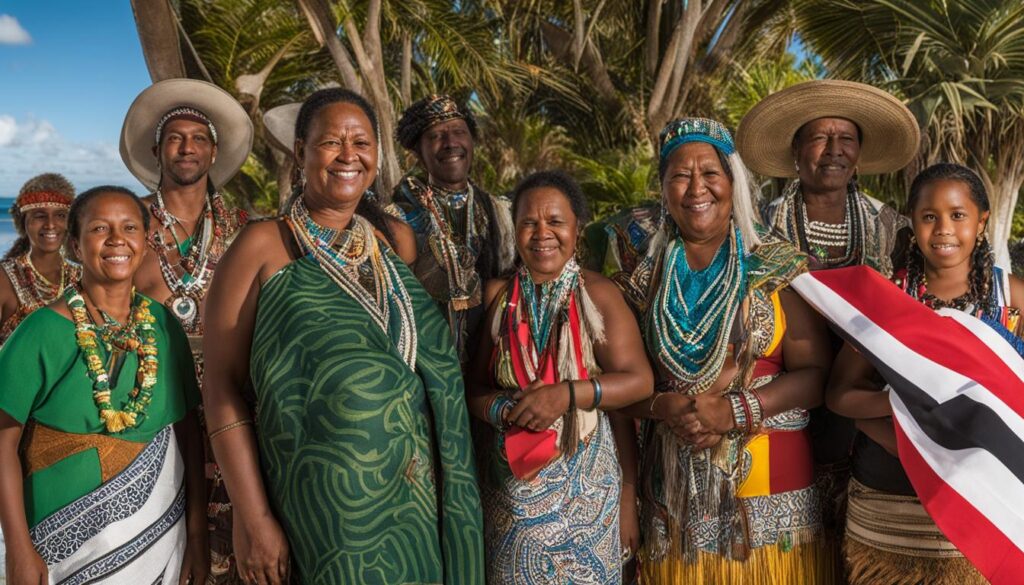
The Importance of Government Funding
The funding provided by the Australian Government serves as a lifeline for the preservation of Torres Strait Islander languages. It enables Indigenous Language Centers to operate and carry out vital language revitalization efforts, ensuring that these languages continue to be spoken and passed down to future generations.
Supporting Indigenous Language Centers
The funding supports community-based Indigenous Language Centers, which function as key hubs for language documentation, preservation, and education. These centers play a crucial role in revitalizing and maintaining Torres Strait Islander languages, working closely with communities and Elders to ensure the cultural integrity of language revival initiatives.
Empowering Language Workers
Through the allocated A$10 million, the Australian Government is investing in the development of innovative digital solutions, digital skills programs, and career pathways for language workers and linguists. This initiative aims to equip language workers with the necessary tools and knowledge to document, preserve, and revitalize Indigenous languages.
Collaboration with Indigenous Communities
We recognize that language preservation is a collaborative effort, and we are committed to ongoing engagement and collaboration with Indigenous communities. By working together, we can ensure that language revitalization initiatives are aligned with the needs and aspirations of the Torres Strait Islander community.
Investing in Cultural Heritage
The Government’s investment in language preservation is an investment in the cultural heritage of Torres Strait Islander communities. By preserving and revitalizing Indigenous languages, we are safeguarding an invaluable and irreplaceable part of Australia’s diverse cultural tapestry.
Collaborative Efforts with Indigenous Communities
The preservation and revitalization of Aboriginal and Torres Strait Islander languages require collaborative efforts and ongoing discussions with Indigenous communities. We recognize the importance of engaging with various stakeholders to develop and implement effective Indigenous languages policies. One such collaborative effort is the National Indigenous Languages Convention, which serves as a platform for Indigenous Language Centers, government bodies, industry representatives, educational institutions, and the community to come together.
Through the National Indigenous Languages Convention, we facilitate open dialogues and information sharing to ensure that the preservation and revitalization of Indigenous languages are guided by the needs and aspirations of the Indigenous community. This collaborative approach allows us to co-create solutions that address the unique challenges and opportunities in preserving and promoting Aboriginal and Torres Strait Islander languages.
Key Collaborative Initiatives:
- Bringing together Indigenous Language Centers, government bodies, industry representatives, educational institutions, and the community
- Facilitating open dialogues and information sharing through the National Indigenous Languages Convention
- Co-creating solutions to address the challenges and opportunities in language preservation and revitalization
By actively engaging with Indigenous communities, we ensure that our policies and programs are inclusive, respectful, and aligned with the aspirations of the people whose languages and cultures we aim to preserve. Collaboration is at the heart of our efforts to create a sustainable and effective framework for the revitalization of Aboriginal and Torres Strait Islander languages.
“Language is not just a means of communication, it is a way of seeing, understanding, and connecting to the world. Collaborating with Indigenous communities ensures that the revitalization of their languages is rooted in the rich cultural heritage and aspirations of the people themselves.”
The power of collaboration is evident in the progress we have made so far in preserving and revitalizing Indigenous languages. By continuing to work together, we can safeguard this valuable heritage for future generations and foster a culturally diverse and inclusive Australia.
Indigenous Language Revitalization Programs
Language revitalization programs play a crucial role in the preservation and promotion of Indigenous languages. These initiatives focus on reclaiming and revitalizing languages that have been endangered or lost due to historical factors. By collaborating with Elders, conducting archival research, and engaging with the community, these programs aim to revive languages and ensure their transmission to future generations.
Through these language revitalization efforts, we can contribute to the preservation of Indigenous cultural heritage and the revitalization of languages in the Torres Strait and across Australia.
“Language is more than just words; it holds the essence of our cultural identity and connects us to our ancestors.”
These programs involve various strategies to revive Indigenous languages, such as:
- Developing language immersion programs
- Creating language learning resources
- Organizing cultural events and language workshops
- Supporting language documentation and research
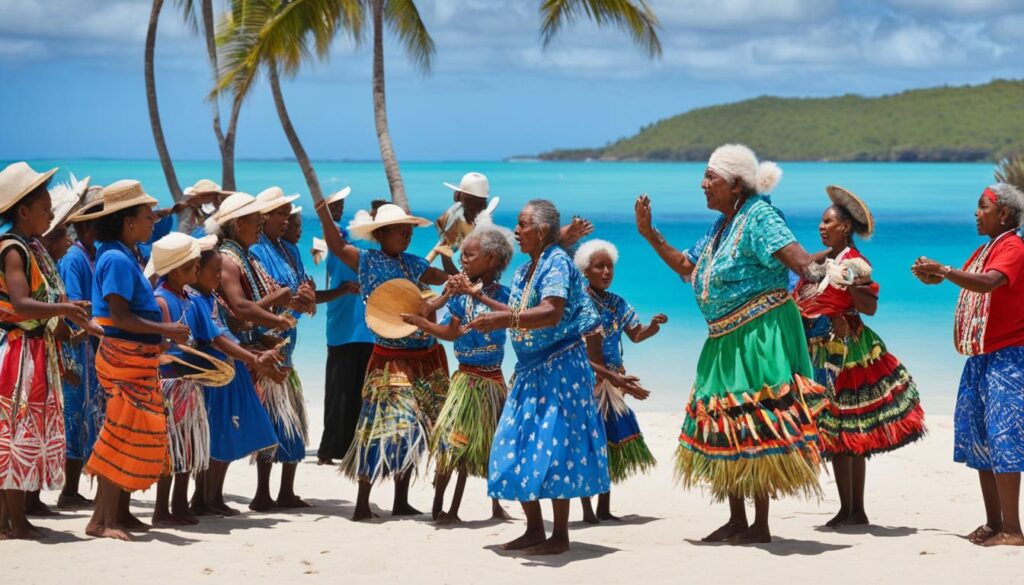
The revitalization of Indigenous languages not only preserves linguistic diversity but also strengthens the cultural fabric of Indigenous communities. It allows for the transmission of traditional knowledge, stories, and values that are integral to their cultural identity.
By supporting and participating in these language revitalization programs, we can contribute to the preservation of Indigenous cultural heritage and empower Indigenous communities to reclaim their linguistic identity. Together, we can ensure that the rich tapestry of Indigenous languages continues to thrive for generations to come.
Incorporating Indigenous Languages in Education
Education plays a crucial role in the preservation and revitalization of Indigenous languages. We believe that by teaching children in their first language, particularly during their early years, we can greatly improve their educational outcomes. It is essential to integrate Indigenous languages into schools and educational institutions to not only transmit cultural knowledge but also strengthen the connection between language and cultural identity. Through this integration, we can empower future generations to embrace their linguistic heritage and create a more inclusive and culturally diverse learning environment.
The Benefits of Indigenous Language Education
Incorporating Indigenous languages into education has numerous benefits for both Indigenous and non-Indigenous students. Here are some key advantages:
- Preserving and Revitalizing Traditional Languages: By incorporating Indigenous languages into the curriculum, we actively contribute to the preservation and revitalization of traditional languages.
- Strengthening Cultural Identity: Language is deeply intertwined with cultural identity. By learning and using Indigenous languages, students foster a stronger connection to their heritage and develop a sense of belonging.
- Improved Educational Outcomes: Studies have shown that teaching children in their first language enhances their cognitive development and academic performance. It provides a solid foundation for further learning and engagement.
- Fostering Intercultural Understanding: Incorporating Indigenous languages in education promotes intercultural understanding and respect among students from different backgrounds. It helps to break down barriers and build bridges of communication.
“Incorporating Indigenous languages in education is a powerful way to acknowledge and honor the rich linguistic and cultural diversity of our country.”
Successful Examples of Indigenous Language Integration
Many schools and educational institutions in Australia are already taking proactive steps to incorporate Indigenous languages into their curricula. Here are a few successful examples:
| School/Institution | Location | Integration Approach |
|---|---|---|
| Bawaka Cultural Experience | Yirrkala, NT | Integrates Yolngu language and culture into education through immersion programs, cultural excursions, and language classes. |
| Woorabinda State School | Woorabinda, QLD | Offers a bilingual program that provides instruction in both English and the local Wadja Wadja language. |
| Marrara Christian College | Darwin, NT | Includes an Aboriginal and Torres Strait Islander culture and language program that encompasses various aspects of Indigenous knowledge and traditions. |
These initiatives serve as inspiring models for incorporating Indigenous languages into education, fostering cultural pride, and promoting intercultural understanding among students. They demonstrate the commitment to preserving and revitalizing traditional languages while enriching the overall educational experience.
Incorporating Indigenous languages in education not only benefits Indigenous communities but also enriches the cultural fabric of our nation as a whole. It is a powerful way to acknowledge and honor the rich linguistic and cultural diversity of our country. By embracing Indigenous languages, we can create a more inclusive and culturally sensitive learning environment that celebrates and values the linguistic heritage of the Torres Strait and all traditional languages throughout Australia.
The Power of Language in Cultural Connection
Speaking in Indigenous languages is more than just a form of communication. It is a powerful way for Indigenous communities to connect with their ancestral spirits and maintain a strong cultural identity. Language holds deep meaning and serves as a platform for passing on cultural knowledge and heritage from one generation to the next.
By speaking and learning their first languages, Indigenous communities strengthen their sense of belonging and create a bridge to their cultural roots. Language is a vital part of their cultural heritage, and it plays a crucial role in preserving and transmitting indigenous traditions, stories, and spirituality.
Just as language shapes and reflects culture, cultural heritage is deeply engrained in language. Each word and phrase carries historical wisdom, traditions, and customs that have been passed down through generations. The linguistic heritage of Torres Strait Islander communities not only tells stories of the past but also holds the keys to understanding the present and shaping the future.
“Language is the road map of a culture. It tells you where its people come from and where they are going.” – Rita Mae Brown
Linguistic Heritage in Torres Strait
In the Torres Strait, preserving linguistic heritage is of utmost importance. The region is home to three main languages: Kala Lagaw Ya, Meriam Mir, and Yumplatok (Torres Strait Creole), each with its distinct dialects and cultural significance. These languages connect the Torres Strait Islander communities to their land, spiritual beliefs, and ancestral practices.
| Language | Number of Speakers | Region |
|---|---|---|
| Kala Lagaw Ya | Approximately 7,000 | Western and Central Torres Strait islands |
| Meriam Mir | Approximately 2,000 | Mer Island and Meriam community in the Eastern Islands |
| Yumplatok (Torres Strait Creole) | Approximately 25,000 | Widely spoken across the Torres Strait region |
Through dedicated language revitalization efforts, these languages are being documented, taught, and celebrated. Language centers, community initiatives, and educational programs are working together with Torres Strait Islander communities to ensure the preservation and continuity of their unique linguistic heritage.
By valuing and supporting the linguistic heritage of Torres Strait Islander communities, we honor their rich cultural legacy and contribute to a vibrant, diverse, and inclusive society.
Conclusion
Preserving Torres Strait Islander languages is vital for safeguarding Indigenous cultural heritage. These languages are not just tools for communication; they hold immense knowledge about law, history, spirituality, and the deep connection to the land. Efforts such as government funding, collaboration with Indigenous communities, and integrating Indigenous languages in education are essential in this endeavor.
By valuing, preserving, and revitalizing Indigenous languages, we can ensure that this invaluable cultural heritage is passed on to future generations. Language preservation strengthens Indigenous communities and fosters a more inclusive and culturally diverse society. It allows us to honor and respect the unique contributions of Torres Strait Islander peoples to Australia’s rich cultural tapestry.
Together, we have the power to make a difference. Let us continue supporting initiatives that promote language preservation and celebrate the Indigenous cultural heritage of the Torres Strait. By working hand in hand, we can create a future where the beauty and wisdom of these languages continue to thrive and inspire generations to come.
FAQ
Why is it important to preserve Torres Strait Islander languages?
Preserving Torres Strait Islander languages is crucial for safeguarding Indigenous cultural heritage and maintaining ancestral connections. These languages hold important knowledge about law, history, spirituality, and land connection.
How many Indigenous languages are spoken in the Torres Strait?
Three main languages are spoken in the Torres Strait: Kala Lagaw Ya, Meriam Mir, and Yumplatok (Torres Strait Creole). Each language is specific to different islands and communities.
What efforts are being made to revitalize Indigenous languages in the Torres Strait?
There are various language revitalization programs and initiatives in place, including collaboration with Elders, archival research, and community engagement. These efforts aim to reclaim and revitalize endangered or lost languages with the help of Indigenous communities and language centers.
How are Indigenous languages integrated into education?
Many educational institutions are incorporating Indigenous languages into their curriculum and organizational structure. Teaching children in their first language, especially in the early years, has been found to improve educational outcomes and strengthen cultural identity.
How linguistically diverse is Australia?
Australia is home to more than 250 Indigenous languages, including approximately 800 dialects. This linguistic diversity reflects the cultural richness and heritage of the nation.
What is the connection between language and cultural identity?
Language is an integral part of cultural identity. Indigenous languages carry cultural knowledge, stories, spirituality, and customs, connecting communities to their ancestors, land, and law. By preserving and revitalizing Indigenous languages, cultural heritage is maintained and future generations have a strong sense of identity.
What are the challenges faced in preserving and revitalizing Indigenous languages?
Historical factors such as forced relocation of Indigenous communities and the removal of children from their families have had a significant impact on the transmission of languages and cultural knowledge. However, collaborative efforts with Elders, records, and language centers are helping reclaim and revitalize endangered languages.
How can language diversity in the Torres Strait be acknowledged?
Acknowledging language diversity involves recognizing and celebrating the linguistic differences among Indigenous communities. In the Torres Strait, there are three main languages spoken: Kala Lagaw Ya, Meriam Mir, and Yumplatok (Torres Strait Creole).
What role do language centers play in preserving Indigenous languages?
Language centers are essential hubs for language documentation, revitalization, and the development of resources like dictionaries. They actively work in preserving, maintaining, and promoting the diversity of Indigenous languages.
How is the Australian government supporting language preservation?
The Australian government provides funding through the Indigenous Languages and Arts grant program to support language centers and diverse traditional and contemporary Indigenous arts projects. They are also investing in digital solutions, digital skills programs, and career pathways for language workers and linguists.
How does collaboration with Indigenous communities play a role in language preservation?
Collaboration with Indigenous communities ensures that language preservation efforts are informed by the needs and aspirations of the community. Partnerships with organizations such as the Australian Institute of Aboriginal and Torres Strait Islander Studies and the Australian National University help develop comprehensive reports on Indigenous languages.
What are Indigenous language revitalization programs?
Indigenous language revitalization programs focus on reclaiming and revitalizing endangered or lost languages. These programs involve collaboration with Elders, archival research, and community engagement to revive languages and pass them on to future generations.
How does incorporating Indigenous languages in education benefit communities?
Integrating Indigenous languages into education strengthens the transmission of cultural knowledge and fosters a greater sense of cultural identity and belonging among Indigenous communities. It also promotes mutual understanding and cultural diversity among all Australians.
How does language contribute to cultural connection?
Language is a powerful tool for connecting with ancestral spirits and maintaining a strong cultural connection. Speaking and learning first languages strengthens the sense of cultural identity and belonging within Indigenous communities, preserving Indigenous cultural heritage for future generations.
Source Links
- https://www.latrobe.edu.au/nest/naidoc-preserving-indigenous-languages/
- https://en.unesco.org/creativity/policy-monitoring-platform/protecting-preserving-celebrating
- https://aiatsis.gov.au/explore/languages-alive
Nayeli is our dedicated Editor in Chief, bringing her passion for words and keen editorial eye to every piece of content we produce. With years of experience in the field, she ensures that every article and publication meets the highest standards of quality and clarity. Nayeli’s commitment to storytelling and her deep understanding of our mission make her an invaluable leader in our team.
-

 Culture2 weeks ago
Culture2 weeks agoUnderstanding Aboriginal Totem Significance
-

 Torres Strait Islanders4 hours ago
Torres Strait Islanders4 hours agoSacred Healing: Discovering Indigenous Health Secrets
-

 Torres Strait Islanders5 hours ago
Torres Strait Islanders5 hours agoJourney to Wellness: Indigenous Health Product Guide
-

 Torres Strait Islanders5 hours ago
Torres Strait Islanders5 hours agoCultural Vitality: Indigenous Health Tips
-

 Torres Strait Islanders4 hours ago
Torres Strait Islanders4 hours agoEmbrace Indigenous Wisdom: Top Well-Being Products
-

 Torres Strait Islanders4 hours ago
Torres Strait Islanders4 hours agoHolistic Health: Indigenous Wellness Explored
-

 Torres Strait Islanders5 hours ago
Torres Strait Islanders5 hours agoNature’s Wisdom: Indigenous Well-Being Remedies
-

 Torres Strait Islanders4 hours ago
Torres Strait Islanders4 hours agoIndigenous Health Products Guide for Wellness
